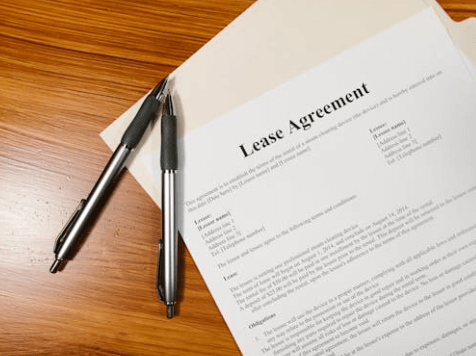When entering a rental agreement, the significance of having a formal lease and reading it thoroughly before you sign must be balanced. This crucial document outlines key terms and conditions that tenants and landlords must adhere to, ensuring clear expectations and responsibilities for both parties. Without a formal lease, individuals may face unforeseen challenges that could have been easily avoided with due diligence. By prioritizing having a formal lease and reading it thoroughly, renters can safeguard their rights, avoid potential disputes, and foster a harmonious living environment.
Real estate investors like Steve Daria and Joleigh emphasize the importance of meticulously reviewing every lease document before committing. Their extensive experience in the industry has shown that many rental issues stem from overlooked lease clauses and misunderstood terms. By reading and fully understanding a formal lease, tenants can prevent potential legal and financial pitfalls, ensuring a smoother rental experience.
Why a Formal Lease is a Non-Negotiable
Before we explain the importance of having a formal lease and reading it thoroughly, it’s essential to understand that a formal lease serves as a crucial legal safeguard for both landlords and tenants by outlining their rights and responsibilities.
It establishes the duration of the tenancy, rent amount and payment schedule, conditions for lease termination, and rules regarding property maintenance and use.

Without a formal lease, both parties are vulnerable to misunderstandings and disputes over expectations, financial obligations, and property maintenance, which could lead to costly legal proceedings and uncertainty about their legal rights and obligations.
Preventing Misunderstandings
A formal lease agreement acts as a detailed roadmap that sets clear expectations and responsibilities for both landlords and tenants.
By explicitly stating crucial details such as the rent amount, due dates, maintenance obligations, and rules governing property use, the lease minimizes the potential for misunderstandings that could arise from ambiguous verbal agreements or assumptions.
This clarity not only promotes a smoother rental experience but also fosters a more transparent and respectful relationship between the parties involved, reducing the likelihood of disputes and enhancing overall satisfaction with the rental arrangement.
Securing Financial Investments
A formal lease agreement serves as a crucial financial safeguard for real estate investors and property sellers by establishing a clear framework for rental income management.
It outlines the terms of rent payment, including amounts, due dates, and acceptable methods of payment, ensuring consistency and predictability in cash flow.
Moreover, in the unfortunate event of tenant default or breach of contract, the lease provides a legal foundation for pursuing remedies such as eviction proceedings or financial restitution, thereby protecting the financial investments tied to the property.
Get An Offer Today, Sell In A Matter Of Days…
Components of a Formal Lease
Having a formal lease and reading it thoroughly before you sign is crucial. Here are the components of a formal lease:
Basic Tenant and Landlord Information
In addition to stating the names and contact details of the tenant(s) and landlord(s), a comprehensive lease agreement should also include their respective roles and responsibilities.
This clarity helps to establish accountability and streamline communication between both parties throughout the period of the tenancy.
By clearly identifying the involved parties from the outset, the lease reduces potential misunderstandings regarding who to contact for issues related to rent payments, maintenance requests, and lease renewal discussions, thereby fostering a more efficient and transparent rental relationship.
Detailed Property Description
Accurate details about the property, including the address, type of property, and any included amenities, are crucial for clarity.
Lease Term and Renewal Clauses
Specify the duration of the lease and include clauses for renewal or termination.
This helps both parties plan for their future needs.
Types of Leases
Having a formal lease and reading it thoroughly is essential before signing. Explore the types of leases to make informed decisions.
Fixed-Term Lease
A fixed-term lease specifies a set period which the tenant agrees to rent the property.
This is beneficial for landlords who prefer stability and predictability.
Month-to-Month Lease
A month-to-month lease automatically renews each month until either party decides to terminate it.
It’s flexible but requires clear terms to avoid frequent disruptions.
Sublease Agreement
In this arrangement, the tenant leases a part of the property to a third party.
Landlords must clearly outline the rules for subleasing to avoid complications.
Key Clauses to Include in a Lease
Discover the key clauses to include in a lease to avoid pitfalls.
- Rent Payment Details: Clearly state the value of rent, the due date, acceptable payment methods, and any late fees. This ensures timely payments and reduces financial disputes.
- Security Deposit Terms: Outline the amount, purpose, and conditions for refunding the security deposit. This protects both parties and encourages property maintenance.
- Maintenance and Repair Responsibilities: Specify who is responsible for different types of maintenance and repairs. This prevents disagreements and ensures the property remains in good condition.
Tips for Drafting a Strong Lease
Here are the tips for a strong lease to avoid issues.
- Consult Legal Professionals: Always talk with a real estate attorney when drafting a lease. They can ensure all legal documents are met and that your interests are protected.
- Use Clear and Simple Language: Avoid using complex jargon and use clear, straightforward language. This makes the lease easily understandable for all parties involved.
- Update Regularly: Laws and regulations change, so it’s crucial to review and update your lease regularly to remain compliant and effective.

Common Mistakes to Avoid
Explore these common mistakes to avoid to avoid potential issues.
- Vague Terms: Ensure all terms are specific and clear. Vague terms can lead to misunderstandings and legal disputes.
- Ignoring Local Laws: Leases must comply with local, state, and federal laws. Ignoring these can result in penalties and invalidation of the lease.
- Failing to Include Key Clauses: Omitting essential clauses, such as those regarding rent increases or property modifications, can cause significant issues down the line.
Strategies for Effective Lease Management
Here are the essential strategies for effective lease management.
- Digital Documentation: Use digital platforms to manage lease agreements. This provides easy access and ensures documents are securely stored.
- Regular Communication: Maintain open communication with tenants. Regular check-ins can help identify and resolve potential issues before they escalate.
- Lease Audits: Conduct periodic audits of your lease agreements to ensure they remain fair and compliant with current laws.
Conclusion
The importance of having a formal lease and reading it thoroughly cannot be overstated. It is a fundamental tool that provides legal protection, clarifies expectations, and secures financial investments. For real estate investors, property sellers, house buyers, and landowners, a well-drafted lease is essential for successful and stress-free property management.
By understanding the critical elements and best practices for creating and managing leases, you can protect your interests and foster positive relationships with your tenants. Remember, the key to a victorious lease is clarity, compliance, and regular updates.
**NOTICE: Please note that the content presented in this post is intended solely for informational and educational purposes. It should not be construed as legal or financial advice or relied upon as a replacement for consultation with a qualified attorney or CPA. For specific guidance on legal or financial matters, readers are encouraged to seek professional assistance from an attorney, CPA, or other appropriate professional regarding the subject matter.

